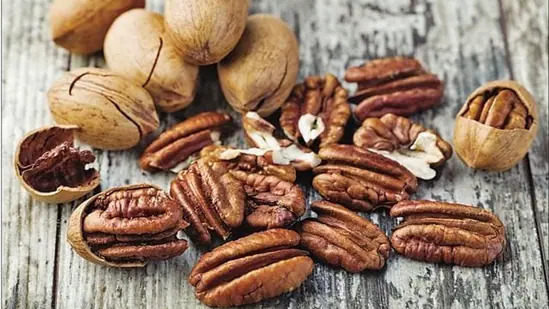According to a new study, eating a diet rich in pecans can lower cholesterol levels.
The study’s findings were published in the journal ‘The Journal of Nutrition.‘
In a study conducted by researchers at the University of Georgia College of Family and Consumer Sciences, participants at risk for cardiovascular disease who ate pecans for an eight-week intervention saw significant improvements in total cholesterol, triglycerides, and low-density lipoprotein (LDL), or “bad” cholesterol.
Jamie Cooper, a professor in the FACS department of nutritional sciences and one of the study’s authors, said, “When considered in the context of different intervention studies, this dietary intervention was quite successful.”
“We had some folks who went from having high cholesterol at the beginning of the research to not being in that group after the intervention,” Cooper continued.
Participants who ate nuts had a 5% reduction in total cholesterol and a 6% to 9% reduction in LDL, according to the researchers.
For background, the researchers cited a prior meta-analysis of 51 cholesterol-lowering exercise regimens that found an average reduction of 1% in total cholesterol and 5% in LDL cholesterol.
“Compared to many other lifestyle programs, adding pecans to the diet not only caused a bigger and more consistent reduction in total cholesterol and LDL, but it may also be a more sustainable method for long-term health,” Cooper said.
“Some data suggests that even a 1% drop in LDL is related with a slight reduction in the risk of coronary artery disease, so these reductions are clinically relevant,” Cooper added.
Researchers divided 52 adults between the ages of 30 and 75 into three groups based on their risk of cardiovascular disease.
One group consumed 68 grams of pecans per day or around 470 calories; a second group swapped pecans for a comparable amount of calories in their regular diet, and a third group did not consume pecans.
Participants ate a high-fat meal for eight weeks to see what happened to their blood lipids and how much glucose, or sugar, was in their blood.
The two pecan groups had similar changes in fasted blood lipids, but the group that added pecans had lower post-meal triglycerides.
The group that substituted pecans had reduced post-meal glucose levels.
“We noticed benefits and relatively similar responses in total cholesterol and LDL cholesterol in particular whether people added them or substituted other foods in the diet for them,” said Cooper, who is also the head of the UGA Obesity Initiative.
Researchers speculated that the gains could be attributed to pecans’ recognized bioactive characteristics.
Pecans are strong in heart-healthy fatty acids and fiber, which have both been associated to reduce cholesterol levels.
Follow Crispbot on Facebook and Twitter. For the latest news, tech news, breaking news headlines, and live updates checkout crispbot.com













